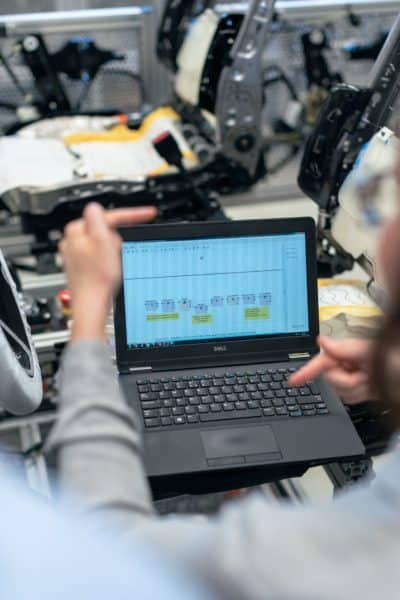The manufacturing industry has always used big machines to create and process products. However, most of these pieces of equipment still rely on people to operate. Aside from being costly (companies have to pay a lot of workers and experienced supervisors regularly), this way of operation is also prone to human errors. Production is also not as efficient because humans have limitations.
That’s why many factories and facilities are now turning to robotics to increase efficiency while reducing labor costs. While it’s true that industrial robots have become more and more popular in this industry, manufacturers are still faced with many challenges when using these automated machines in their processes.
Make no mistake—implementing robotics is not as easy as buying a robot and plugging it in. There are several logistical and financial considerations to factor in before a robot can be put to good use.
IMAGE: PEXELS
What Is an Industrial Robot?
An industrial robot is a type of robot used in the manufacturing industry. It is programmable, automatically controlled, and capable of movement in multiple directions. Typically, it consists of a controller, robot arm, end effector, servo drives, and sensors.
Industrial robots are commonly used for ironing, welding, assembling parts, palletizing, picking and placing materials, testing, and inspecting products, all of which are accomplished with speed and accuracy. The most common robot system configurations for industrial automation include gantry robots, SCARA robots, and articulated robots.
Reasons To Use Robots In Manufacturing
Implementing robotics in the manufacturing industry has many benefits. That’s why more and more manufacturers are starting to use this technology. Here are just some of the advantages that it offers.
- Better product quality. While the technical potential of robots differs across various industries, one thing’s for sure—unlike humans, these modern machines are not prone to errors and can deliver results with almost 100% accuracy. This significantly helps improve output quality and customer satisfaction.
- Optimized productivity. You can program a piece of robotic equipment to operate at an optimal level for 24 hours straight. This results in higher production rates within a short period of time.
- Safety. Factory workers are often prone to workplace hazards, as this is the nature of their job. Now, smart machines can take the place of people working in dangerous environments. This helps reduce workplace injuries and any possible negative effects on worker health, especially in high-risk industries like mining.
- Reduced cost. Implementing a robotic automation system is, by far, the most cost-efficient option when running a manufacturing company. One robot can replace dozens of workers, helping you save on wages. The initial investment can be offset by a quick return on investment (ROI) that may be achieved in as little as two years.
Challenges Manufacturers Face When Implementing Industrial Robot Systems
Robotic automation offers many advantages to the manufacturing industry. It does help speed up production with better accuracy while lowering labor costs. However, manufacturers also face many challenges before successfully implementing robotics into their processes. Here are just four of the most notable ones.
Training Employees To Get The Right Skillset
Although robotic systems are quite efficient, they call for a new level of expertise. To acquire this, you will need to have your employees trained on how to operate the new machines. You may also have to hire new employees with proper education, certifications, and robotic experience.
Budgeting For The Robotic System
As industrial robots become more available, their prices are steadily dropping. However, the implementation of industrial robots still requires a substantial initial investment. You must maintain a steady production volume and sales level during the expected ROI period to compensate for the upfront investment.
Managing A Streamlined Product Workflow
Another thing to consider when installing robots in manufacturing is how to manage and streamline the production workflow. Carefully calculating the speed, presentation, and orientation of the robotic parts will ensure maximum productivity without stressing the existing system too much.
Implementing Safety Measures
While industrial robots are useful, they may also present new hazards to your workplace. With that said, you also need to introduce new safety standards to your employees. There will be strict guidelines and regulations that must be followed when it comes to robotic safety.
And, you need to take these into consideration before buying or installing robots to ensure compliance, or else you might face harsh penalties. Regardless, implementing these safety measures creates a better working environment for your workers.
Conclusion
With the increasing competition and consumer demands for high-quality products, industrial robots are now a necessity. However, installing one is not as easy as you may think. It needs a lot of research and planning.
Moreover, you’ll need the help of experts. It’s not an overnight process. But when you successfully implement a robotic system, you will see a significant increase in your productivity and bottom line. You can browse through our site for more interesting posts about technology.
If you are interested in even more technology-related articles and information from us here at Bit Rebels, then we have a lot to choose from.


COMMENTS